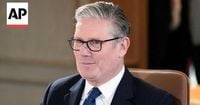In the tense wake of US airstrikes on Iranian nuclear facilities, British Prime Minister Sir Keir Starmer has been actively engaging with world leaders to urge de-escalation and a return to diplomatic negotiations. The strikes, which targeted three key sites in Iran—Natanz, Isfahan, and Fordo—were carried out on the night of June 21, 2025, by US B-2 stealth bombers flying non-stop from Missouri. According to US Defence Secretary Pete Hegseth, the operation "devastated the Iranian nuclear programme," marking a significant escalation in efforts to curb Iran's nuclear ambitions.
Sir Keir's response was swift and measured. While there was no UK involvement in the strikes, the Prime Minister was briefed in advance and immediately convened an emergency Cobra meeting on June 22. In a series of calls with key international figures—including US President Donald Trump, France's Emmanuel Macron, Germany's Friedrich Merz, as well as the leaders of Jordan and Oman—Starmer emphasized the urgent need for Iran to return to the negotiating table and warned of the risk of escalation spreading beyond the Middle East.
Downing Street confirmed that in his conversation with President Trump, Starmer reiterated the grave threat posed by Iran's nuclear programme to international security. The two leaders agreed that Iran must never be allowed to develop a nuclear weapon and committed to maintaining close contact in the coming days. A No 10 spokesperson stated, "They discussed the actions taken by the United States last night to reduce the threat and agreed that Iran must never be allowed to develop a nuclear weapon." They also agreed to stay in close contact to manage the evolving situation.
Further diplomatic efforts included calls with Sultan Haitham bin Tarik al Said of Oman and King Abdullah II of Jordan. In these conversations, Starmer stressed that "an escalation of the conflict is in no-one's interests and the focus must be on de-escalation." Both leaders joined in urging Iran to pursue a diplomatic solution by returning to negotiations, highlighting the shared international concern over the potential for regional instability.
Foreign Secretary David Lammy also played a pivotal role, engaging with counterparts in Iran and Israel to advocate for a negotiated resolution to the crisis. Lammy's recent travels underline the UK's commitment to diplomacy; just last week, he met with US officials in Washington and was part of a European delegation that met Iranian representatives in Geneva on June 20.
The backdrop to this diplomatic flurry is Iran's contentious nuclear programme. Tehran insists its uranium enrichment, recently reaching 60%, is for peaceful research and development. However, the International Atomic Energy Agency (IAEA) has reported that Iran has accumulated enough enriched uranium to potentially produce nine nuclear bombs, a development described as "a source of legitimate concern." Iran's ambassador to the UK, Seyed Ali Mousavi, denied any intention of military aggression but indicated that Iran was considering the "quantity and quality" of its response to the US strikes.
Meanwhile, Israeli President Isaac Herzog acknowledged that Iran's nuclear programme had been "hit substantially" but admitted he was unaware of the precise details beforehand. Israel has been actively targeting military sites within Iran in recent days, prompting Iranian retaliatory fire, further escalating tensions in the region.
Domestically, the UK government is taking the situation seriously. Business Secretary Jonathan Reynolds underscored Iran's threat to the UK, stating, "There is simply no way a responsible British government would ever allow [Iran] to possess nuclear weapons." He refrained from outrightly endorsing the US strikes but emphasized that preventing Iran from acquiring nuclear arms aligns with the UK's national interests. Reynolds lamented Iran's failure to heed diplomatic calls for peace, calling it "a mistake." The head of MI5 had earlier revealed that since 2022, intelligence services have thwarted 20 Iran-backed plots within the UK, underscoring the tangible security risks posed by Tehran.
In preparation for potential fallout, the UK has moved military assets to the Middle East and raised British forces to their highest alert level in the region. The Prime Minister assured the public that these measures aim to protect British interests, personnel, and allies amid growing instability.
The international community's reaction has been mixed. UN Secretary-General António Guterres condemned the US strikes as a "dangerous escalation." In contrast, Conservative leader Kemi Badenoch praised the US for taking "decisive action against a regime that fuels global terror and directly threatens the UK." Liberal Democrat leader Ed Davey called for urgent de-escalation and a diplomatic resolution, echoing the Prime Minister's stance.
The unfolding crisis has also impacted travel and commerce. The UK's Foreign, Commonwealth and Development Office (FCDO) has advised against all travel to Israel, the Occupied Palestinian Territories, and Iran. It has arranged a chartered flight from Tel Aviv for vulnerable British nationals and their dependents, pending the reopening of Israeli airspace. British Airways has paused flights to Dubai and Doha, canceling all flights scheduled to leave London Heathrow on June 21 and their return journeys, with flexible rebooking options extended through July 6.
As the situation remains fluid, the world watches closely. The US warns of "far greater" attacks should Iran fail to seek peace swiftly, while Iran's leadership vows significant retaliation for the strikes. The delicate balance between military action and diplomatic engagement hangs in the balance, with Sir Keir Starmer and his international counterparts striving to steer the region away from further conflict.
In the midst of these high-stakes developments, the call for calm and negotiation resonates louder than ever. The coming days will be critical in determining whether diplomacy prevails or if the region descends into deeper turmoil.




